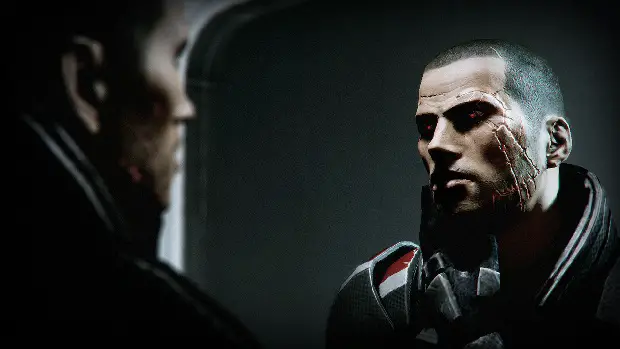Over here at Gaming Trend, we have a lot of staff members who are fans of choice-driven games. We’ve rambled on about Bioware games for hours, debated about TellTale choices, and have been pretty strongly moved by a lot of the decisions developers have asked us to make vicariously through our in-game avatars. I decided it was time to talk about the choices, both big and small, that had the greatest effect on all of us, so I asked some of the guys to pitch in and talk about the choices that stick out to us most.

I grew up on choices.
One of the first games I played on the PC (Apple II, actually) as a kid was Ultima IV: Quest of the Avatar. If there is a game filled with choice, it’s that one. How you treat others, your personal sacrifices, humility and virtue, and everything else that made you The Avatar was laid out over the course of 50 hours of gameplay, but it had a far longer reach than that for me. From the moment that Gypsy flipped the choices cards in her wagon until the moment I used the Bell, Book, and Candle to enter the Stygian Abyss, plumbed its depths, and created the symbol of the Avatar through the knowledge I gained in that game to open the Codex of Ultimate Wisdom, I was making hard choices. It had a shaping effect on how I grew up and how I conduct myself as a person. Lord British was right — being The Avatar is the endless quest of a lifetime.
One of the toughest choices I had to make in the Ultima series came courtesy of a oft-overlooked side dungeon in Ultima V: Warriors of Destiny. In this dungeon there is a room full of children locked away in a cell. Obviously letting the little ones out of their imprisonment is the right choice, but as soon as the lock clicked they streamed out of their cage and attacked my party. I was now faced with a difficult choice of killing children or leaving them locked in their cell. If I left them in their cell, they’d starve to death or worse. If I let them out, I had no choice but to put them out of their misery. (Later plays through the game it dawned on me that I could charm them or put them to sleep, but I digress) I vividly remember pushing back from my desk, leaving the game paused as it waited for commands on my next turn. This moral checkpoint when I was only 12 years old was huge, and I was paralyzed by the decision. I ended up turning off my monitor and going outside for a bit to really think this through. When people talk about games as art, moments like this are exactly what they mean. In a game about spells, Shadowlords, magical trinkets, and talking horses (Hi Smith!), I encountered a moment that remains forever etched on my mind. Sure, I can recite the spells from memory, and I could probably draw the map without reference, but it’s this moment that has stuck with me 26 years later.
In more modern choice world, two come to mind immediately and both are from Bioware. If you’ve not completed Mass Effect 3, turn away now. Seriously, right now.
Near the end of Mass Effect 3, you are given a terrible choice. Actually several, but none was as unsettling for me as having to either doom the Quarians or the Geth. I was very attached to Legion by this point, watching his growth as he became a “he” instead of an “us”. Tali was my go-to girl for my party. Either way, I was losing a dear friend, and right after I had to make a similar choice with Mordin and the Krogan. If I saved Mordin, I doomed an entire race. No matter the choice for either scenario, I was betraying someone I’d spent countless hours befriending. It was gut wrenching.
It’s also why I continue to be a gamer, year after year. Moments like these make it more than just hammering on buttons and keys. — Ron Burke, Editor in Chief
If there’s one thing that I love to do in games it’s to shape a character.
I’ve played many games just because I knew it started with a character creator, and knew that I would be able to play as an in-game version of myself. But also making my own character typically means making some pretty difficult decisions vicariously through them. In games with binary good and evil choices, I opt for the latter just because that’s how games like Fable conditioned me to play, but in games like Mass Effect and Dragon Age, I actually put a lot of myself into the character I was playing as. As such, the decisions I had to make carried greater weight than anything I went through when I was just choosing to be nice or just plain awful to people I came across.
Regardless of whether the decision turned you into one of the people holding pitchforks under every article that focused on the Mass Effect 3 ending or not, it’s hard to say that the choice of how to handle the Reapers wasn’t one that weighed heavily on every one that played it.
As someone who holds the Mass Effect series up as my favorite series in games, having to pick between the three options I had at the end of Mass Effect 3 was a harrowing experience. All three choices were presented as being fatal for protagonist Commander Shepard, and would have widespread repercussions for the various characters and civilizations I had come to love across all three games.
I originally chose to control the Reapers, as it seemed to be the choice that would save the most lives, even if it cost Shepard his. However, as I marinated on the choice, I realized that I wasn’t comfortable leaving the galaxy and all the friends I’d made in a place where the Reapers were still alive, and could one day become a threat to them. So I then shifted over the option to destroy the Reapers and all synthetic life using Reaper code. In the end, it saved Shepard, but still leaves me with pangs of guilt when I reflect on it. But the world of Mass Effect is one I hold too close to my heart to leave in a state of uncertainty.
While the consequences of what could happen to the Mass Effect world made the end of Mass Effect 3 such a painful choice, recently I found that one of the smallest, seemingly insignificant choices of Dragon Age: Inquisition is the one that keeps sticking out to me as the most difficult.
As the game neared its conclusion, I had one of the last conversations with Dorian Pavus, the character that I had been in a romantic relationship with throughout the game, and it was here he told me he was considering leaving our group of misfits with noble goals of reforming his corrupted homeland of Tevinter.
I was stunned. Despite my love of the Dragon Age lore, Dorian was my center for the entirety of Inquisition. My Inquisitor was practically a blank slate until I started filling in gaps of his backstory by using his relationship with Dorian as a jumping off point. Seeing what his father tried to do to him, and so deeply feeling the anger I did when I found out, I had become more attached to Dorian than any other character in the Dragon Age series.
So here I was, given the option of telling Dorian he could leave or asking him to stay. Choosing between being selfless or selfish left me crushed, and it told me a bit about myself that I opted to ask him to stay. After the game’s final boss, I spoke with Dorian again where he told me he had decided to stay with the Inquisition. When I asked him if he was comfortable not returning to his homeland, he gave me a reassuring response:
“There’s no you in Tevinter. What else matters?” — Kenneth Shepard, Lead News Editor
I can’t remember any of the choices I’ve had to make in the hundreds of games I’ve played over the years, but thankfully I just finished playing through Far Cry 3 and I can speak on the big decision the game surprises you with at the end.
The story takes place on an island where protagonist Jason Brody and his crew have the misfortune of choosing as their party scene. The island has been hijacked by pirates, and the island’s native inhabitants, including a tribe called the Rakyat, are subjected to the pirate’s violence. Jason and his friends end up getting kidnapped, though Jason himself escapes and vows to rescue his friends.
You eventually meet the leader of the Rakyat, a vixen named Citra, who sets you on the path to becoming a warrior and the savior of their tribe. She’s certainly a “looker”, as Jason astutely points out, and at the end of the game when presented with the choice of saving his friends or becoming Citra’s mate, I chose to ditch the baggage and commence with the mating.
Hey, a shallow story calls for shallow decisions! — Sean Lama, Editor
When you talk choice in a game, the idea of emotional ultimatums is what immediately comes to mind. Moments like Mass Effect’s Virmire, the ending of Bastion, or really any episode of any Telltale game are what have come to define choice.
There was a choice I had to make a long time ago, though. One before I even knew that choice would ever be a thing in gaming. I had to pick which Pokemon I would start my journey with.
Yes, Pokemon Red and Blue. It’s a seemingly inconsequential decision; in a game of 151 monsters to collect, choosing the first one out of three seems insignificant. By choosing your Pokemon, however, you’re setting the tone for your journey.
That starter you choose becomes your companion, your hunting buddy, and your business partner. You’re starting up an empire of well-trained Pokemon, and they’re in at the ground floor. That Charmander is what helps you catch your first Pokemon, and your second, third and most after that. Your Squirtle is a key player in taking down that first gym. Bulbasaur helps you beat trainer after trainer, and is always the first into battle.
Your starter is usually the first Pokemon you see evolve. Every time you visit the PC, it’s hard to consider switching out another Pokemon for your starter’s top spot. There are a lot of difficult, emotional choices to be made in gaming, ones you pain and ache over long after the credits roll. But choosing your starter? That’s just the beginning of a wonderful journey. — Eric Van Allen, Editor
Choices. Video games are all about choices, from the smallest to the biggest. They are what makes a game interactive as they offer each player a slightly different experience from others. But the choices I enjoy, the choices that makes me enjoy a game the most, are the one’s that clearly define my game from everyone else’s. I enjoy making big choices, but my favorite games are the one’s that offer consequences to those decisions. This is why Bioware has been my favorite developer ever since I was a kid, as Knights of the Old Republic showed me that you could make meaningful choices that influence a game’s story and make your experience unique.
This has been my favorite thing that a video game can do for a long time, make my experience unique from others. From the story decisions I have to make in The Wolf Among Us to the gameplay decisions I make in a game like Elite: Dangerous, I have always enjoyed knowing that no one can stake a claim to an experience I’d had because it was unique to me. Either in actuality or in interpretation.
So I bet that it won’t surprise you that Mass Effect 2 is my favorite game of all time. The Suicide Mission at the end of the game was a cornucopia of consequences for actions you had taken before assaulting the Collector Base. Loyalty, ship upgrades, decisions on fire teams… they all had serious consequences, as you risked life and death for each of the party members you had spent tens of hours with. It was incredibly satisfying to know that who I lost was unique to me, and was my fault, and that because of my actions certain members wouldn’t exist in the third entry. It was emotional, and heartbreaking, as I lost characters I cared about… but at the same time it was empowering as my experience was further separated from that of others.
Not every choice needs to be big to create a unique experience either. Such as your encounter with the reporter across all three Mass Effect games, which can result in a variety of ways. Even if she doesn’t seem to carry over everything you were talking about with each visit with her, you do and that’s enough to create a unique interpretation of the relationship between these two acquaintance characters. I know most people punch her for the laughs, but there are different outcomes to this.
That’s the past though, how about this year? What games did I feel best created decisions that influenced the experience? Well, these few will probably not surprise anyone who has read my Game of the Year list. While I can’t go over all the choice-driven games on my list, I want to talk about two that treat choices in a different manner. First up, my Game of the Year for 2014… This War of Mine. You can check out my review if you want to know more.
This harsh war survival game has a different experience for decision-making then most games, and even if it doesn’t always make you feel the consequences for what you’ve done, the decisions themselves are always compelling. Most importantly, they are hardly ever done with a box of choice A or B. The choices in This War of Mine are almost always done naturally through gameplay, and there aren’t many games that are willing to deliver narrative choice like that. By having that, This War of Mine became one of the most engrossing experiences I’d ever played. I felt like I was the one performing these actions, and that I was the one bearing the weight of the results.
Now to contrast that, I will talk about The Walking Dead Season 2. It has a very different method of choices then those in This War of Mine. It’s a point-and-click adventure game, where nearly every choice you make is in a dialogue box. While I like choices made naturally through gameplay a lot, I’m not saying this format completely doesn’t work. After all, it managed to create the most compelling and difficult choice I’ve had to make in a game this year. I am of course, talking about the ending.
I tried to stop them, but in the end I had to choose between Kenny and Jane. Kenny, a familiar face, had been going a little crazy recently which made it difficult to trust him. Jane on the other hand had been pretty reasonable thus far… but in the end I remained loyal to Kenny, and was rewarded with what I consider to be the game’s best ending. The process of making that decision was difficult, and I sat there with the timer running out trying to make a decision for several long seconds as the two struggled. A cold sweat covered my hand, and as Jane died I didn’t know if I’d made the right choice.
So there are many different ways to make choices in games, and I love how every one of them can be done well. Some games execute it better than others for sure, but it doesn’t rob the prior one’s of any value. I’m not saying making choices with consequences is necessary to have fun in a game by any means, sometimes choices in-and-of themselves are compelling after all, but it is my favorite thing to have in a game. So I can’t wait to see what difficult choices I have to make going ahead, and the consequences that follow them. Maybe some day a game will finally knock Mass Effect 2 off of it’s pedestal as my favorite game of all time. — Niko DelValle, Contributor

See below for our list of partners and affiliates:






























